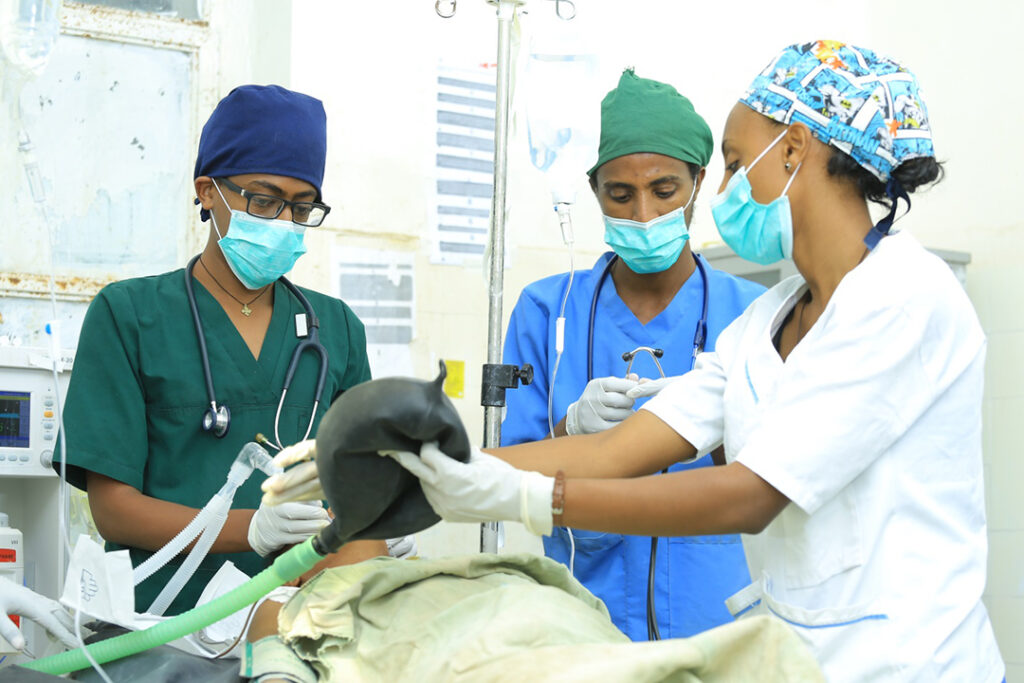ADF STAFF
The U.S. Agency for International Development (USAID) has embedded infectious disease experts in 10 emergency operations centers across Ethiopia to train local health officials to treat COVID-19 while keeping themselves safe in the process.
The USAID-trained Ethiopian public health experts will serve in the capital, Addis Ababa, and in nine regional emergency operations centers across the country. They are part of USAID’s Medicines, Technologies and Pharmaceutical Supplies (MTaPS) project and have a history of training health workers in Ethiopia. The current project calls for training doctors and nurses working in quarantine and isolation centers, developing health worker protection protocols, and creating plans to prevent COVID-19 transmission at border crossings.
“This will help strengthen the management capacity of infection, prevention and control programs,” USAID said in announcing the program on its Facebook page, “and help health workers employ safety precautions in handling COVID-19 cases, including proper isolation and facility access measures, and reinforce health facilities’ capacity for efficient triage operations.”
Ethiopia is among 13 countries — nine in Africa — the project is working with to stem the spread of the novel coronavirus that causes COVID-19.
“We have already been collaborating with these host countries to strengthen their pharmaceutical systems, improving the availability, safety, and efficacy and use of medical products and related services that ensures attainment of desired health outcomes,” MTaPS Program Director Francis “Kofi” Aboagye-Nyame, said in a statement announcing the project. “The rapid scale-up of our work will both help them contain the coronavirus now and support sustainable, responsive health care into the future.”
A study published in March in the medical journal The Lancet listed Ethiopia among the top five African countries most vulnerable to the spread of COVID-19. At the time, the authors noted that Ethiopia and several other countries benefited in their fight against COVID-19 from the systems put in place to screen travelers and residents for Ebola during that 2014-2016 epidemic.
But Ethiopia has not been overwhelmed by cases, with about 400 reported so far. The country has been praised for taking early action.
“Starting from early March, the government has taken serious measures such as shutting down schools and also declared a state of emergency to prevent large gatherings and congregations,” said Tsion Firew, advisor to Ethiopia’s Minister of Health on the television show Straight Talk Africa.
Tsion noted that close collaboration with airlines to screen and quarantine passengers who have traveled abroad and outreach to religious communities to curtail mass gatherings have been key.
“The stringent preventive measures taken are very vital,” she said. “And I would argue that the reason that we haven’t seen the spread of the disease to deadly numbers are because of the stringent measures.”
Since the global outbreak of COVID-19, the United States has committed $37 million to help Ethiopia fight the spread of the potentially fatal virus. The U.S. is working with Ethiopia’s ministries of Health and Peace, the Ethiopia Public Health Institute and the National Disaster Risk Management Commission on the nation’s ongoing response to the disease.
Earlier in May, U.S. and Ethiopian officials signed a new $230 million development partnership agreement that includes continued investment in health along with education, agriculture and economic growth.

